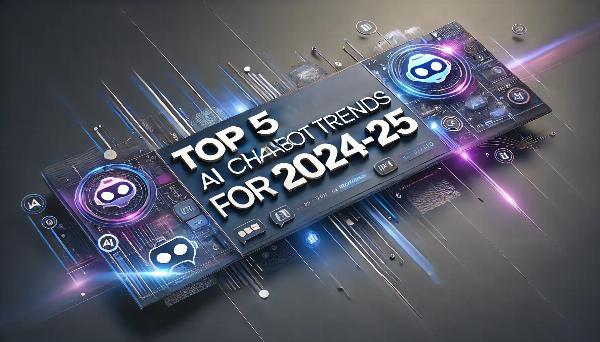Top 5 AI Chatbot Trends for 2024-25

Artificial Intelligence (AI) continues to redefine the ways we interact with technology, from automating mundane tasks to enhancing customer experiences. One of the most prominent areas where AI is making a substantial impact is through chatbots. AI-powered chatbots are now integral to industries like customer service, healthcare, finance, and even personal assistance. As we look ahead to 2024-25, several trends are poised to shape the future of AI chatbots, making them more intelligent, efficient, and versatile than ever before.
In this article, I’ll explore the top five AI chatbot trends for 2024-25, showcasing how these advancements will transform industries and enrich user experiences.
1. Hyper-Personalization and Emotional Intelligence
In 2024-25, hyper-personalization will be one of the most significant trends in AI chatbot technology. As users interact more with AI chatbots, they will demand personalized experiences that go beyond simple question-answer formats. AI chatbots are moving toward delivering customized interactions based on user behaviour, preferences, and past conversations. This hyper-personalization allows chatbots to not only respond accurately but also anticipate user needs and provide tailored solutions.
For example, in the retail sector, AI chatbots can recommend products based on users’ browsing and purchase histories. In healthcare, personalized chatbots can offer tailored medical advice or reminders to patients, creating a more supportive environment. The ability to customize responses based on real-time data will lead to deeper user engagement and satisfaction.
A key component of hyper-personalization is emotional intelligence. Chatbots are now being trained to recognize user emotions using natural language processing (NLP) and sentiment analysis. This development allows chatbots to detect and respond to the emotional tone of users’ messages. For instance, if a user is frustrated or upset, a chatbot can respond empathetically, offering supportive responses or escalating the issue to a human agent if needed. In more sensitive areas like AI chatbots 18+, where personal or intimate interactions may occur, emotional intelligence becomes even more critical, ensuring responses are appropriate and considerate. As chatbots become more emotionally intelligent, they will create more meaningful and human-like interactions, enhancing the overall user experience.
2. Voice-Enabled AI Chatbots
The rise of voice technology is another key trend in the AI chatbot landscape for 2024-25. Voice-enabled AI chatbots allow users to communicate with systems through spoken commands, making interactions faster and more natural. The success of virtual assistants like Amazon’s Alexa, Google Assistant, and Apple’s Siri has demonstrated the growing importance of voice-based AI.
As speech recognition and NLP technologies continue to improve, businesses will increasingly incorporate voice-powered chatbots into their customer service and product interfaces. For example, users will be able to ask voice-enabled chatbots to check their bank balance, order products, or schedule appointments without the need to type. The convenience of hands-free, voice-powered chatbots will further enhance user experiences across industries such as healthcare, retail, and telecommunications.
In sectors like healthcare, voice chatbots can make services more accessible, allowing patients to verbally communicate their symptoms and receive medical advice. The retail industry will also benefit from voice-enabled chatbots that help customers browse and shop more easily by speaking their preferences. As more devices adopt voice technology, the integration of voice-enabled chatbots will become an essential component of user-friendly services.
3. AI Chatbots for Mental Health and Emotional Support
AI chatbots are increasingly being used to provide mental health support and emotional care. With rising awareness of mental health issues and the global demand for mental health services, AI chatbots are stepping in to bridge gaps where human resources may be limited. Chatbots like Woebot and Replika are already offering valuable services to users by providing emotional support, therapeutic conversations, and even mental health monitoring.
As we move into 2024-25, AI chatbots will become even more sophisticated in their ability to detect and respond to emotional cues. Using advancements in sentiment analysis and machine learning, these chatbots will be able to gauge users' emotional states and offer appropriate responses. For instance, if a user expresses feelings of stress or sadness, the chatbot can provide coping mechanisms, suggest activities to improve mood, or refer users to mental health professionals when necessary.
The round-the-clock availability of AI chatbots makes them particularly useful for providing immediate support to those who may not have access to traditional therapy or counselling services. While they will not replace human therapists, these AI-powered tools can supplement care, offering users 24/7 emotional support in a confidential and accessible manner.
4. AI Chatbots in E-Commerce
In 2024-25, AI chatbots will continue to revolutionize the e-commerce industry by enhancing customer engagement, increasing sales, and streamlining user experiences. AI chatbots in e-commerce are already proving their value by handling a range of tasks, including answering customer queries, recommending products, and facilitating transactions. However, the future holds even greater possibilities.
The integration of AI chatbots into e-commerce platforms allows businesses to provide more personalized shopping experiences. Chatbots can assist users in finding the right products based on their preferences, answering complex questions about product specifications, and even processing orders in real-time. The ability to provide 24/7 customer service is another significant advantage, ensuring that users receive assistance whenever they need it, even outside of business hours.
Additionally, AI chatbots are becoming more adept at upselling and cross-selling products. By analyzing user behaviour and purchase history, these chatbots can suggest complementary items or upgrades that enhance the shopping experience. As chatbot technology advances, e-commerce platforms will see improved customer satisfaction, higher conversion rates, and increased average order values.
5. Ethical Considerations and Data Privacy
As AI chatbots become more embedded in daily life, particularly in sensitive areas like healthcare, customer service, and AI sexting, data privacy and ethical considerations will be at the forefront of their development. AI chatbots collect a vast amount of personal data to offer personalized experiences. This data includes user preferences, purchase history, and even sensitive information like health records and financial details.
In 2024-25, companies developing AI chatbots will need to prioritize transparency and ethical data practices. Compliance with data protection laws such as the General Data Protection Regulation (GDPR) and the California Consumer Privacy Act (CCPA) will be crucial. Users are becoming more aware of their data privacy rights, and businesses must ensure that they clearly communicate how user data is being collected, stored, and used.
Furthermore, as chatbots enter more personal and intimate domains, such as mental health support or ai sexting, developers will need to establish clear ethical guidelines for chatbot behaviour and interactions. Ensuring that users are fully aware of how their conversations and data are handled is essential to maintaining trust. Implementing ethical AI development practices will be critical in preventing misuse, bias, and breaches of privacy.
Conclusion
As we move into 2024-25, the role of AI chatbots will continue to expand across industries, transforming how businesses and individuals communicate. From hyper-personalized experiences and voice-enabled interactions to mental health support and e-commerce automation, chatbots are becoming more intelligent and adaptive to user needs.
However, with this rapid advancement comes the need for ethical considerations and data privacy measures. Businesses must navigate the balance between innovation and responsibility, ensuring that users feel secure while benefiting from the conveniences AI chatbots offer.
By staying ahead of these top AI chatbot trends, companies can leverage this technology to create more engaging, efficient, and personalized user experiences. As AI chatbots evolve, they will play a pivotal role in shaping the future of customer interaction, emotional support, and online services.
Note: IndiBlogHub features both user-submitted and editorial content. We do not verify third-party contributions. Read our Disclaimer and Privacy Policyfor details.



